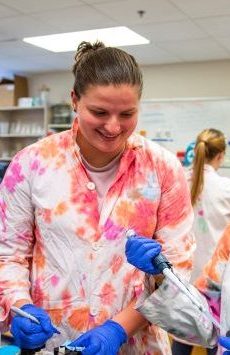MS in food Science & Human Nutrition
The MS in Food Science and Human Nutrition is available in-person or online. Students may focus their classes on food technology or nutrition topics or combine both disciplines. The requirements and admission prerequisites vary for each of the MS pathways:
The in-person MS includes a variety of classes with hands-on experience and research opportunities. Faculty research programs include nutrition-related behavior change, obesity prevention, food processing and preservation, food safety and quality, seafood quality, sensory evaluation, and product development.
The Online MS concentration is designed to meet the needs of food industry and nutrition and health personnel seeking to develop more proficiency in food science and human nutrition. Available only for non-thesis students.
The combined MS Online UMaine Dietetic Internship concentration is an integrated online master’s and in-person internship program with rotation sites offered within Maine. This degree leads to eligibility to sit for the registration exam to become a registered dietitian nutritionist (RDN). Only students who have graduated from a didactic program in dietetics (DPD) accredited by the Accreditation Council for Education in Nutrition and Dietetics (ACEND) are eligible to apply to the Dietetic Internship.

Want to Become a Registered Dietitian?
If you have completed an ACEND accredited didactic program in dietetics (DPD), you are eligible to apply for the combined MS Online UMaine Dietetic Internship concentration.



Interested in a thesis?
A thesis is a great way to gain experience in food science and nutrition research and is only available for the in-person MS program or the combined MS Online UMaine Dietetic Internship concentration. Thesis opportunities are available depending on graduate advisors and funding. If you’re thinking about earning your PhD, visit our program page. Please contact a graduate faculty member whose research interests you.
Our faculty have expertise in:
community nutrition, food insecurity, childhood nutrition,
integrative health, metabolism, aging, food processing and preservation,
food safety and quality, sensory evaluation, product development, and food-related behavior.
How to fund your degree
There are several funding options available for eligible graduate students. Thesis students may be funded through the School of Food & Agriculture, but funding is competitive. MS Online students are not eligible for thesis research, graduate assistantships, and/or fellowships.
Other sources of funding may be available for thesis and non-thesis students on the UMaine campus, but it is essential that applications are completed by January 15 if you wish to be considered for financial support.

